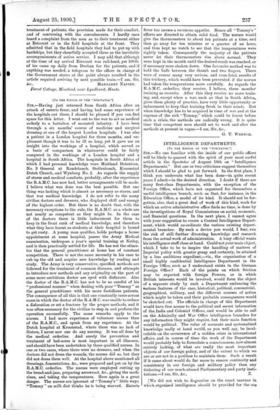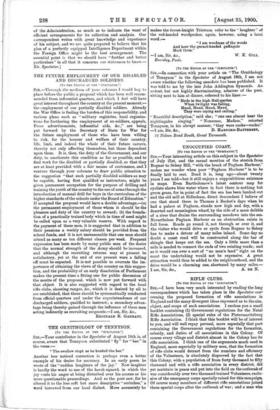INTELLIGENCE DEPARTMENTS.
[TO THE EDITOR OR THE "SPECTATOR.") SIE,-NO one familiar with the inside of our public offices will be likely to quarrel with the spirit of your most useful article in the Spectator of August 18th on " Intelligence Departments." But one or two criticisms suggest themselves which I should be glad to put forward. In the first place, I think you underrate what has been done—in quite recent years I admit—in the desired direction. I doubt if there are many first-class Departments, with the exception of the Foreign Office, which have not organised for themselves a useful intelligence branch, such as that, for instance, in the Education Office, a model of its kind. It should not be for- gotten, also, that a great deal of work of this kind, work for which an active administrative office finds no time, is done by the investigations of Royal Commissions on social, economic, and financial questions. In the next place, I cannot agree with your suggestion to create a Central Intelligence Depart- ment, which would co-ordinate the various existing depart- mental branches. By such a device you would, I fear, run the risk of still further divorcing knowledge and research from the actual work of administration. A busy official wants his intelligence staff close at hand. Could not your main object, which I take to be to inspire the handling of matters of Imperial policy with greater grasp and certainty, be attained by a less ambitious expedient,—viz., the organisation of a small highly confidential Intelligence Department in the Foreign Office, such as I understand exists in the German Foreign Office ? Each of • the points on which friction may be expected with foreign Powers, or in which British interests would be involved, would form the object of a separate study by such a Department embracing the various features of the case, historical, political, commercial, geographical, military, and the different courses of action which might be taken and their probable consequences would be sketched out. The officials in charge of this Department would have free access to the political and secret information of the India and Colonial Offices, and would be able to call on the Admiralty and War Office intelligence branches for any information they might require, but their main function would be political. The value of accurate and systematised knowledge really at hand would, as you well say, be incal- culable on the occurrence of a sudden crisis in international affairs, and in course of time the work of the Department would probably help to formulate a consciousness, now almost entirely lacking, of what are really the most important objects of our foreign policy, and of the extent to which we are or are not in a position to maintain them. Such a result -if it came about would do far more to ensure continuity and consistency in our foreign and military policy than any tinkering of our much-abused Parliamentary and party insti- [We did not wish to dogmatise on the exact manner in which organised intelligence should be provided for the use of the Administration, so much as to indicate the want of efficient arrangements for its collection and analysis. Our correspondent writes with great knowledge and experience of his subject, and we are quite prepared to believe that his plan of a perfectly equipped Intelligence Department within the Foreign Office might be the best arrangement. The essential point is that we should have " further and better particulars" in all that it concerns our statesmen to know.— E D. Spectator.]



































 Previous page
Previous page